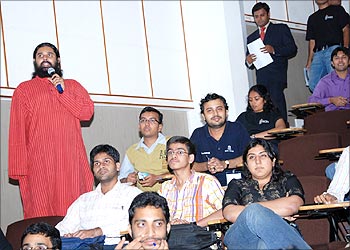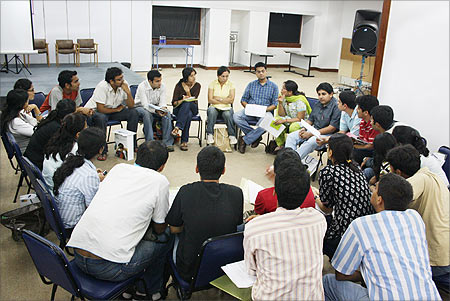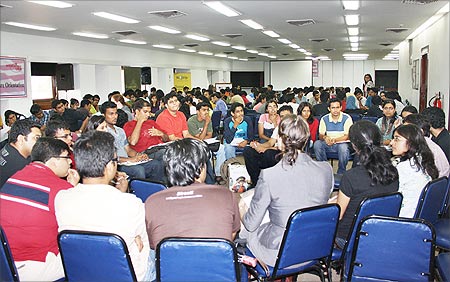Photographs: Rediff Archives Princi Sharma, Careers360
AICTE has directed technical institutes and universities to appoint ombudsmen to address student grievances faster. Is this a good move?
Do you recall the excitement surrounding the Lokpal movement last August?
Citizens across the country participated in the debate because they saw it as a mechanism to curb corruption. Efforts are still on to get the Lokpal Bill passed.
Yet, when the move to appoint an ombudsman (Lokpal) to eliminate irregularities in technical education is being pushed for, most of the institutions are either not aware of it or are concerned about its successful implementation.
Recently technical education regulator, All India Council for Technical Education (AICTE) came out with regulations relating to the appointment of Ombudsman in technical universities, which will address grievances of current and potential students. The notification has also been published in the official Gazette of India.
Dr R Natarajan, former chairman, AICTE, gives us a background.
"As the Prohibition of Unfair Practices in Technical, Medical Educational Institutions and Universities Bill is still pending, an alternative solution and opportunity has been provided to the students for solving their issues," he says.
"Undoubtedly a good initiative, it's also true that to implement any new system, it should be ensured that it is implemented properly. We hope this will do what is expected of it," he adds.
Please click NEXT to continue reading
The ombudsman will address grievances and complaints from students
Image: Image for representational purposes onlyPhotographs: Rediff Archives
It serves as a platform for students to register their complaints or grievances, following which appropriate action will be taken against the institutes in case of any malpractices. These may include:
- Admissions taking place contrary to the merit determined in accordance with the institute's declared policy.
- Withholding or refusal to return documents deposited by students during admissions, with a view to induce or compel such a person to pay any fees in respect of any course of study which the person does not intend to pursue.
- Demands for donation or any capitation fees by the institute.
- Breach of the policy for reservation during the admission process.
- Non-payment or delay in the payment of scholarships to students that such institution is committed to under the conditions imposed by AICTE, or by any other authority.
- Delay in conduct of examinations or declaration of results beyond that specified in the academic calendar.
- Denial of quality education as promised at the time of admission or required to be provided; non-transparent or unfair evaluation practices.
- Harassment and victimisation of students including sexual harassment and refund of fees on withdrawal of admissions as per AICTE instructions from time to time.
How it will function
Each technical institution is to establish a registry and display the address of registry on its notice board, prospectus or website. The registry will be headed by an employee of the institute of appropriate rank, who may be approved by the ombudsman.
- On receipt of an application, the employee in-charge shall inform the ombudsman and shall immediately provide a copy to the institution for furnishing its reply within seven days.
- The ombudsman shall fix a date for hearing which shall be communicated to both, the institution and the aggrieved person. An aggrieved person may appear either in person or may authorize someone.
- The ombudsman shall ensure disposal of every application within one month of receipt for speedy redress of grievance. The technical institution is expected to cooperate with the ombudsman in redress of grievances and failure to do so may be reported by the ombudsman to AICTE.
- On the conclusion of proceedings, the ombudsman shall pass such order, with reasons for such order, as may be deemed fit to redress the grievance and provide such relief as may be desirable to the affected party. The ombudsman will sign on each order and these shall be provided to the aggrieved person and the institution and shall be placed on the website of the technical institution.
- The technical institution shall comply with the order of the ombudsman. Any order by the ombudsman not complied with by institution shall be reported to the AICTE for appropriate action as deemed fit by the Council.
- A complaint shall be filed by the aggrieved student, his/her parent with a special permission from the ombudsman, by any other person. In case of any false/frivolous complaint, the ombudsman may order appropriate action against the complainant.
- The principles and procedures outlined above shall apply to working of the grievance redress committee in the technical institute except (a) in case of lack of unanimity, the grievance committee shall take decision by majority (b) committee shall communicate its decisions within 10 days of receipt of complaint.
- The university and the technical institution concerned shall provide detailed information regarding provisions of grievance redress mechanism, ombudsman and the duties and rights of students in their prospectus.
Who can be an ombudsman?
Image: Image for representational purposes onlyPhotographs: Courtesy Careers360
Ombudsman's profile
AICTE clauses for technical universities:
25. A person who has been a judge, not below the rank of a District Judge
26. A retired professor who has at least 10 years of experience
27. State technical university will appoint ombudsman on a part-time basis from a panel of three names suggested by a search committee comprising the nominee of the Governor of the concerned state as chairman, two vice-chancellors by rotation from public universities of the state concerned, one vice chancellor by rotation from private universities of the state concerned and secretary (Higher Technical Education) of the state concerned as convenor.
28. Central Technical University will appoint ombudsman on a part-time basis from a panel of three names suggested by a search committee comprising AICTE chairman as chairman, one vice chancellor from Central Technical Universities by rotation, joint secretary, higher technical education, MHRD, Government of India and Member Secretary as convenor.
29. Ombudsman will be appointed for a period of three years.
Clauses for technical institutions
The vice chancellor of the affiliating university shall constitute a grievance redress committee consisting of five members for an individual technical institution or a group of technical institutions, keeping in view the location of the technical institutions.
Why do we need an ombudsman?
Image: Image for representational purposes onlyPhotographs: Satish Bodas/Rediff Archives
The director of a technical institution in Coimbatore questions the move, "AICTE is already receiving complaints and ensuring their redress. I don't think that ombudsman can stop the issues like donations when AICTE itself is not able to handle such issue," he said.
Others feel that only successful implementation can justify the move.
Vimal Kumar Aggarwal, Director, Gian Jyoti Institute of Management & Technology, Mohali asks, "We have seen the bodies like this in other areas also. Unfortunately most have them failed to fulfil their objective. Also, why is AICTE not playing the role itself and passing on the buck to others?"
He adds, "There are some good examples also. So if a person of high integrity and good intention is put in place, this can be successful for sure."
Misconduct by management
It is always believed that an institution like ombudsman is independent and free from any control. Yet, some institutions have doubts that the ombudsman might have to function under the control of the management.
"The success of the ombudsman depends upon the intention of its implementation. It should be an independent body, not to be controlled by management like the Central Vigilance Commission," says Dr Bala V Balachandran, Founder & Dean of Great Lakes Institute of Management, Chennai.
"The execution is important," he adds, quoting Thomas Edison who famously said, 'Vision without execution is hallucination'.
Consequences of non-compliance of the regulations
AICTE has outlined several consequences if an institute does not follow the orders given by the ombudsman.
- It may withdraw approval and the declaration of fitness or entitlement to receive grants or financial assistance from the Council.
- It may withhold any grant allocated to the technical institution or declare the institution ineligible for consideration for any assistance under any of the general or special assistance programmes of the Council.
- AICTE may inform the general public, including potential candidates for admission, through a notice displayed prominently in a newspaper or other suitable media and posted on the website/web portal of the Council, declaring that the technical institution does not possess the minimum standards for redress of grievances.
- It may recommend to the affiliating university for withdrawal of affiliation and in case of a state technical university, to the concerned state.
What institutes say
Not all the players are aware of the development. Captain S. Bhardwaj, Vice Chancellor, AMET University, shares, "I am not very much aware about it and don't know the details as well. But if it is implemented in a proper way, it will definitely work."
Dr K L Savithramma, Principal, Dr Ambedkar Institute of Technology, Bangalore had no idea about the notification. She says the information should reach the students. In effect there is confusion all the way.
'Ombudsman will provide quick solutions'
Image: Image for representational purposes onlyPhotographs: Rediff Archives
In this interview, Dr S S Mantha, Chairman, AICTE sheds light on the role of the recently notified ombudsman.
Most institutions are unaware of the ombudsman. Why so?
We have given public notice in the newspapers and it is also available on the AICTE website. Also we are informing institutions individually about it. Around 10,000 institutes are AICTE approved, so it might take some time.
Some institutes feel that the ombudsman might be controlled by the management. What's your take?
I don't think so, because we are giving representation from various fields. And I have seen that when we start something, institutes think that this will put a check and control on their freedom. But actually this will be beneficial for the students facing problems in admissions.
Some institutions ask why do we additionally need an ombudsman for this purpose?
Every year, we receive hundreds of complaints and at times it takes almost a year to provide any solution to them. So, I would say that ombudsman will provide them a quick solution and immediate relief.
How will you ensure successful implementation of these regulations?
This notification is published in the official Gazette of India, which means that it is a subordinate law. Now institutions may at least start a skeleton cell initially. We expect most of the institutions to start it willingly in the beginning and gradually we will ensure that each institution will follow it.






Comment
article